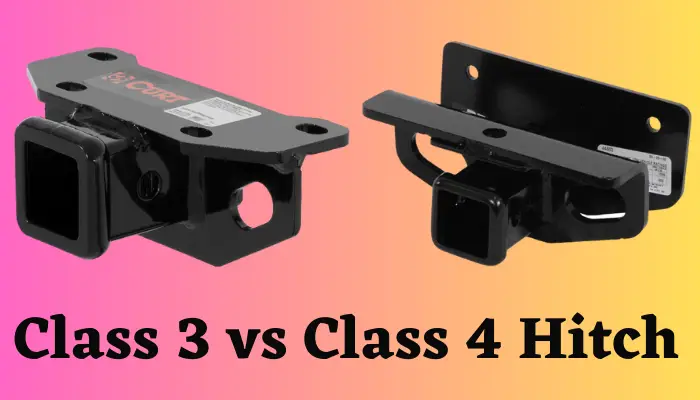This post may contain affiliate links which means I may receive a small commission for purchases made through the links. Learn More
If you’re going to buy a hitch – but confused about the class 3 vs class 3 hitch and feeling literally exhausted, then don’t worry as I am here to rescue you.
I understand the fact that choosing the wrong hitch not only affects your towing experience but also puts your investment at risk. If you have a duty truck, and you end up buying a class 3 hitch, it is purely putting your bucks in the gutter.
But don’t worry, as this guide is going to give complete insight of the difference between these two hitch classes, and after reading you’ll be able to make an informed decision. Let’s go.
What is the difference between Class 3 and Class 4 Hitches?
There are five different classes in hitches and in my previous guide, I have already explained the different types of hitches and their classes. But in this guide, I will talk about just two classes that are considered heavy duty and are used for towing the trailer with heavy loads.
In the section below, I will explain the difference into five factors that help you understand the basic to advance differences. Let’s dive into it.
1- Receiver Size
First of all, let’s talk about the receiver size. The hitch receiver is the point or opening where you attach the hitch mount. So, the question is what is the receiver size of class 3 and class 4 hitch?
Class 3 hitches have a receiver size or opening of 2 inches by 2 inches, whereas the class 4 hitches have an opening receiver size of 2.5 inches by 2.5 inches.
Smaller vehicles like minivans etc can easily be towed or attached by 2 by 2 inches receiver size which comes in level 3 hitches. However, if you’re towing a very heavy-duty trailer or truck, then you’ll need the receiver size of 2.5 by 2.5 inches openings.
This is the major difference that is actually more related to compatibility. For example, the class 4 hitches have bigger openings, so that won’t be compatible to tow the smaller vehicles.
On the flip side, the class 3 hitches have comparatively smaller openings of 2 by 2 inches receiver size, so you won’t be able to tow very big or heavy-duty trucks due to smaller openings.
Can you tow a smaller vehicle with a class 4 hitch? Yes, you can, but you’ll need adapter sleeves that will allow you to convert a Class 4 hitch with a 2.5-inch receiver opening to a smaller size, such as 2 inches.
But I highly recommend you avoid this compilation of using adapter sleeves and make sure you buy the hitch class that you actually need. If you aim to tow a truck or big SUV, the class 4 hitch will be your good companion.
2- Loading capacity & towing limits
The second difference that lies in these two classes is the loading capacity. The class 3 hitch has usually lower loading or towing capacity than the class 4 hitches.
The Class 3 hitches usually have the Gross Trailer Weight (GTW) between 3,500 to 6,000 pounds – and 5000 pounds is the perfect weight for Class 3 hitches.
But the class 4 hitches are totally different as they have the Gross Trailer Weight (GTW) between 8000 to 12000 pounds – and 10000 pounds is the perfect weight for class 4 hitches.
It clearly indicates that the class 3 hitches have lower loading or towing capacity as compared to the class 4 hitches. The reason is that class 3 hitches are made to tow smaller vehicles with lesser weight – but class 4 hitches are made for heavy-duty trucks or SUVs.
If you aim to tow the minivan or smaller SUV whose weight ranges between 4500 pounds to 6000 pounds, then I recommend you to go with class 3 hitches. However, if you aim to tow a heavy-duty SUV, go with class 4 hitches.
3- Tongue weight
In my previous guide, I have already explained the tongue weight, but let me give a brief introduction again for those who are newbies. Tongue weight is the force (downward) that is exerted on the hitch by the trailer and the load present on the trailer.
Every hitch has its own tongue weight, and if the trailer exerts more force due to overloading, then chances are high that the high might break – and you’ll see brutal accidents. So it is important to consider tongue weight.
Class 3 hitches have a tongue weight of 500 pounds as they are made to tow the medium-sized trailer, boats, etc which don’t exert more pressure or force on the hitch.
On the other hand, the class 4 hitches have a tongue weight of 1000 pounds as they are designed to tow the heavy-duty trailer and trucks which exert more force on the hitches. So, these hitches have a higher tongue weight capacity.
4- Structural differences and build quality
There is a basic difference in the structure that I have already explained earlier. The class 3 hitches have smaller receiver openings – having the exact size of 2 by 2 inches.
On the other side, class 4 hitches a bigger sized opening of 2.5 by 2.5 inches – meaning that they are perfect for towing the heavy-duty SUV. But the actual difference lies in the build quality.
If you ask the manufacturer, they say the build quality of both class 3 and 4 hitches is the same. But I don’t agree with that. From my personal experience, I can say with certainty that the build quality of the class 4 hitches is far better than the class 3.
I don’t know the exact reason – maybe because the class 4 hitches are supposed to tow the heavy-duty trailer, so the manufacturer needs to do them. They are usually made with heavier gauge steel which makes them sturdy.
I never mean to degrade the class 3 hitches – but this is what I felt while using class 4 hitches. However, you should keep in mind that class 3 hitches are made for smaller vehicles so the manufacturer compromises on the built quality.
5- Cost and affordability
Probably, one of the most important factors that control our buying decision is the price of the product. The class 3 hitches are less expensive and very much affordable for everyone.
But on the flip side, class 4 hitches are very expensive as they are made with high-quality material – and made to tow heavy-duty trailers so their prices are higher and it won’t be easy for you to afford them.
One thing that I must say is that if you are looking to buy a hitch for normal use, I highly recommend you to go with a class 3 hitch as it is cheaper and is very much capable of towing mid-range trailers.
If you are a professional or run any business and need to tow a heavy-duty trailer, then there is no other way except to choose a class 4 hitch which is very expensive. However, you’ll get more towing capacity and better build quality.
Should I buy a Class 3 or Class 4 hitch?
This is the question that I usually see on online forums and communities, but the answer to this question is very much straightforward. In short, you should buy the class that you actually need. This might sound funny! But this is how it is!
If you’ve read the whole guide, then I am pretty much sure that your basics will be cleared. Let me answer you in detail. Know the type of vehicles you’re going to tow with the hitch.
Suppose you’re aiming to tow a mid-range vehicle like a smaller trailer, boat, or minivan then you’ll need a class 3 hitch as it will give you decent towing weight. You’ll be able to tow mid-range vehicles comfortably.
But if you are professional, and aim to tow heavy-duty trucks, trailers, or SUVs, then I recommend you go with class 4 hitches. Look, heavy-duty SUVs are very heavy and the class 4 hitch will bear the load as they have a gross trailer weight of 10000 pounds.
I hope you got your answer. If you’re still confused, feel free to ask your question in the comment section.
What is a Class 3 hitch used for?
Class 3 hitches are usually used to tow the vehicle which is smaller and has an overall weight lesser than 6000 pounds. Manufacturers suggest towing the trailer or SUVs having a weight of fewer than 5000 pounds with the class 3 hitches.
Below is the list of the vehicle for which you can use class 3 hitches:
- Sedans including mid-size and full-size models
- Towing small trailers, bike racks, or cargo carriers.
- SUVs and Crossovers that have a weight lesser than 6000 pounds
- Minivans
- Pickup Trucks, including trailers, campers, and other heavy loads.
- Certain vans, particularly larger models such as cargo vans or passenger vans.
What can I tow with a Class 4 hitch?
Class 4 hitches are designed to tow heavy-duty SUVs, trucks, and trailers. They have a loading capacity of up to 10,000 to 12000 which means that you can tow bigger vehicles without having to be worried. These types of hitches are used by professionals.
Here is what you can tow with a class 4 hitch:
- Travel Trailers including large RVs, fifth-wheel trailers, and other spacious camping trailers.
- Horse Trailers – If you have horses and need to transport them, a Class 4 hitch can handle horse trailers with multiple horse compartments and added weight.
- Enclosed Cargo Trailers for transporting equipment, furniture, or other heavy loads.
- Heavy Construction Equipment including mini-excavators, skid steers, or compact tractors.
- If you own a large boat, such as a cabin cruiser or a fishing boat with a substantial weight, a Class 4 hitch will provide the necessary towing capacity.
Conclusion
I am being optimistic – and hoping that I have covered everything in this guide that could give you an explanation of the difference between class 3 and class 4 hitch.
If you are still confused and need more explanation, feel free to contact me by commenting on this post, and I will be quick to respond to your query. I hope that my efforts in writing this article will be helpful.

I’m Ahmad – the owner of this website and the writer of this post. I’ve spent 15 years in the automotive industry, especially among the hitches. What you’re reading is the experience of my 15 years.

